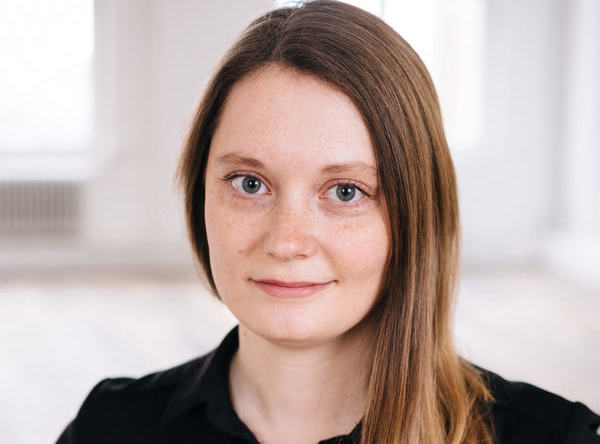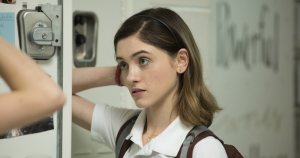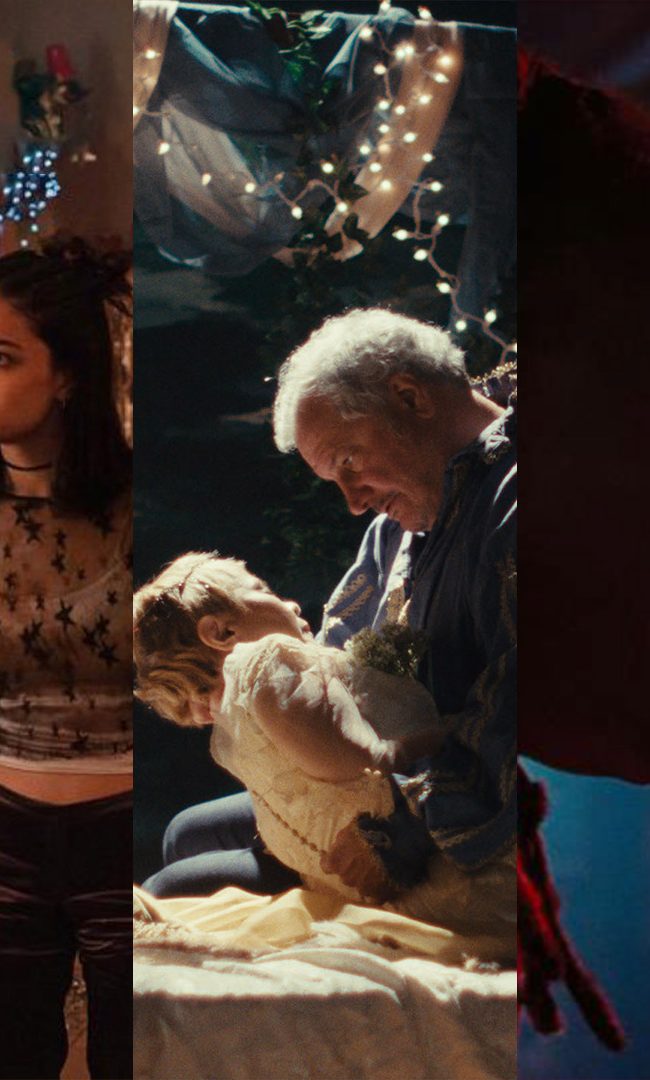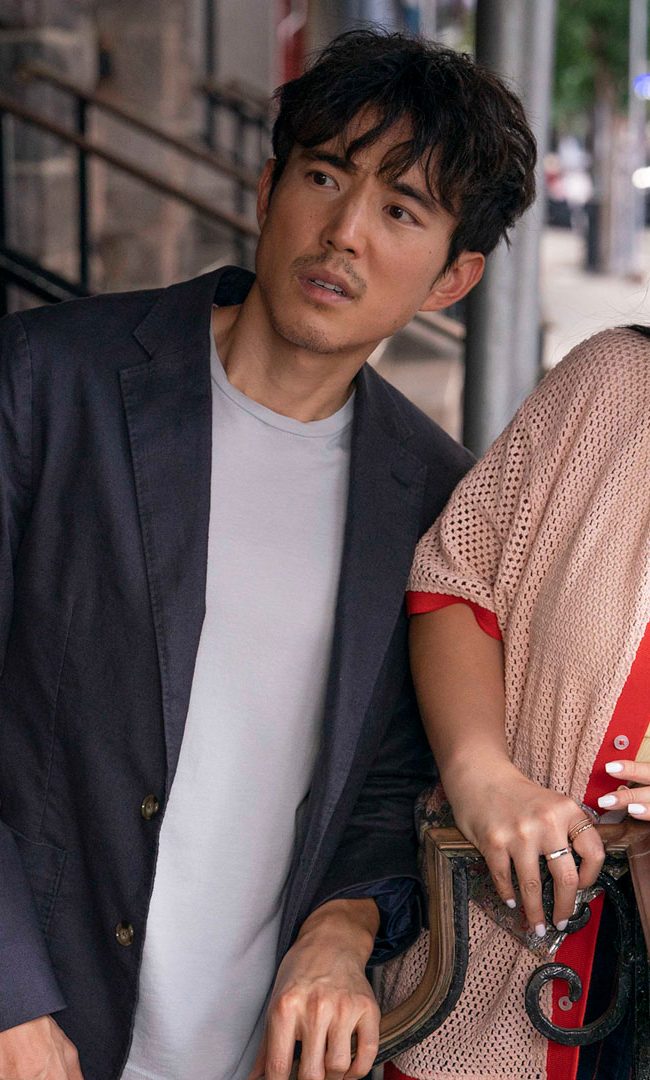A Conversation with Karen Maine (YES, GOD, YES)

I recently spoke by phone with writer/director Karen Maine about her debut feature, Yes, God, Yes (which I also reviewed). In the film, Maine (who also co-wrote the short that was later adapted into the 2014 Obvious Child), revisits the strict Catholic upbringing of her youth, following Alice, her 16-year-old protagonist, on a series of misadventures navigating both teen sexuality and proscriptive dogma. Starring Stranger Things’ Natalia Dyer, the movie offers not only a strong central performance but also a wonderful combination of drama and comedy as it takes down the hypocrisy of organized religion. Here is a condensed digest of our conversation, edited for length and clarity.
Hammer to Nail: So, you’ve now been involved with two shorts that were eventually turned into features: Obvious Child, and Yes, God, Yes. I’ve seen both features, but not the shorts. How much of the feature-length narratives was in both shorts? And what was the process of expansion like in both cases?
Karen Maine: Well, with Obvious Child, the short was made well before we even considered making a feature for it. We just wanted to make a project with friends and make something we hadn’t seen made. And we were like, “We’ll make it ourselves.” Then once we got some success there, Gillian [Robespierre] really pushed to develop it into a feature. Then with Yes, God, Yes…after Obvious Child, I started writing this as a feature and eventually realized I wanted to direct it, myself, and that I probably needed some sort of proof of concept or some kind of a reel, so to speak, or some example of my directorial work, of which I had none. So, we actually made a short. I wrote the short script out of the feature script, which is sort of a bit of a reverse. It was always intended to be a feature.
HtN: How much of the feature is in the short? What did you end up excerpting to make that short?
KM: We took a few scenes. I definitely added some that weren’t in there, but a lot of it is quite similar to the feature. Because again, it was done as a proof of concept. I honestly didn’t think it would have a life of its own, which it ended up having, which has been wonderful. And it’s probably the reason the feature got funded. But yeah, we got about three million views on Vimeo for the short, and it trended on Reddit for like a day or two. So it got a lot more eyes on it than I expected.
HtN: And can one still find it online? I couldn’t find it on Vimeo…
KM: No. I think it’s illegally on YouTube, and there’s nothing we can do about that. But we took it down from Vimeo to sort of promote and focus on the feature. So, it maybe will be included in a DVD extra or something. And the same goes for the Obvious Child short. That’s included in the extras for the DVD and the full-film purchase. So, it’s not online anymore, either.
HtN: You grew up Catholic in Iowa. How much of what is in this film is based on actual experience, rather than just a sort of broad-based “I grew up Catholic in Iowa.”
KM: A lot of it, actually. Yeah. The experiences that Alice goes through in the film are almost all things I experienced. I’d say there’s probably 20% or maybe even 10% that is completely fictionalized. But a lot of the language that you hear the teachers and the priests use, and things that the kids talk about seeing at school…like, I did have to watch a partial-birth abortion video in a class called Christian Lifestyles that was so graphic we had to get permission slips signed by our parents. So yeah, a lot of it actually happened to me.
I would say, though, that the character of Alice became kind of a hybrid of me at that time, and me a few years later. Natalia really brought a sense of what she thought the character was to it, as well, and a sense of herself, I’m sure. So, the character just may be fragments of me, but really her own person. But the experiences are very true to my own upbringing.
HtN: Is that what motivated your choice to then set it in the early 2000s, when dial-up AOL ruled supreme? It’s a very specific time period. I remember dial-up well! I was thinking that if it were set now, it would be so difficult for a Catholic school to keep students from being able to access porn and images like that. It’s just so prevalent. Back then it was a lot harder, at least online. I’m just curious if that was an element in the choice of time period, as well.
KM: Totally. There are two reasons. I mean, one is obviously that that’s when I grew up and that’s how I sort of entered the realm of sexual discovery. Or that was one of the ways I entered it. Also, back then, as far as the internet goes, I feel like parents didn’t really know what was out there. So, it was really easy for a kid or a teen to kind of stumble into something that was maybe a little inappropriate or a little beyond their capacity at the moment. I was once playing Word Scramble and someone just emailed me some naked pictures. I definitely was like, “Yeah, I’ll see more.” I was just really curious. I’d never seen anything like that.

Natalia Dyer in YES, GOD, YES
But another reason it’s set then is because today the internet is just so much more vast and open and there are so many more people on it, that if you feel a sense of isolation growing up, or like you’re a weird one, or don’t feel like any of your peers, you can probably go online and find someone who you relate to. But back then, I feel like because it was a much smaller realm, you couldn’t just hop on and be like, “I did this. Is anyone else doing this?” It just wasn’t at that moment yet. It was still very narrow, I guess. So that was another key element to keeping the character feeling very isolated, in a sense.
HtN: Though your film deals explicitly with sexuality, it’s also very much about the hypocrisy of repressive faith and religion. I’m curious, do you still believe? If so, how have you reconciled your faith with your growth as a human being?
KM: Personally? No. I mean, I’m not Catholic or Christian at all. I think there’s something wrong with people who are, though I definitely know a lot of Christians who embrace sexuality. But for me, being raised in an environment like that, it just really turned me off to that type of religion. Interestingly enough, I married a Jewish man, and I quite like Judaism. So that’s sort of where I’m at, at the moment.
Growing up, you realized that the Catholic Church makes these insane, really difficult-to-adhere-by rules that everyone almost always breaks, and then there’s just the immense guilt and shame that comes with it. They know that these are unattainable. They sort of talk about the shame that’s involved with it. They know you’re going to go wrong and sin, but you’re still expected to feel such guilt and shame over it and repent. That I just find really interesting…that sort of dichotomy.
HtN: I don’t think the Catholic faith is unique in these repressive rules that people ignore and then feel guilty about. I think it’s an aspect of many religions.
KM: Definitely. I think the Catholic Church is unique, though, in some ways, like prohibiting women from having roles of leadership.
HtN: How did you cast? You really have a wonderful ensemble beyond Natalia Dyer. But let’s start with her and then go on to the rest.
KM: Natalia came to us. My producer suggested her for the short when we were casting that. I really didn’t know much about her. Stranger Things, Season 1, had just come out on Netflix like a week before and I hadn’t seen it yet. So I quickly watched some of her scenes. I was like, “She seems great. Totally could do this. She seems very talented.” So, we sent her a cold email with the scripts, because one of my producers just happened to have her email. Then her manager got in touch and she was on board. There was no question after we worked on the short that we would do the feature together, because she was just so perfect for the role.
As far as everyone else is concerned, we worked with some amazing casting directors, Rebecca Dealy and Jessica Kelly. They got us some really great talent to fill out the rest of the roles. Francesca Reale is amazing as Laura. Wolfgang Novogratz is sort of an up-and-coming young actor. He’s done a lot of stuff this summer, but I think mine was one of his first features. I’m not sure.
HtN: And he plays the hairy-armed football star, right? You sure emphasize those arms! Was that actually his hair, or was that added on for the movie?
KM: (laughs) That was added on. It was in the script that he had hairy arms. I saw a cover of a Stanley Tucci cookbook and he has his arms crossed. I just found myself really drawn to his arms, for some reason. So, that’s a bit of adult Karen, I think, that crept into the character of Alice.
For the rest of the cast…Timothy Simons, obviously a big fan of VEEP. He was amazing as Father Murphy. Then Susan Blackwell, who plays Gina at the bar, is a really, really important character. We cast her kind of late in the game. I was really nervous to get the right person, and she was just so great. I think that scene came out perfectly. I’m so happy about it.
HtN: I like that scene, as well. Even Natalia sort of trying to get another drink, and the way the bartender just dismisses her with a head shake, like, “No, that’s not going to happen.”
KM: I know. That woman is amazing. She was just a day player. She was an extra and she was just great.
HtN: It’s the best dismissal I’ve seen. (laughs)
KM: (laughs) It always gets a big laugh.
HtN: So, you successfully debuted this at the 2019 SXSW Film Festival. Here we are now in the summer of 2020. Can you talk about what it’s been like from there to here? Were you preparing to release it maybe earlier and then COVID-19 happened? Or …
KM: Yeah, we were hoping to do a theatrical release on Good Friday, which would have been amazing. (laughs) But yeah, COVID obviously delayed everything and we’re no longer able to do theatrical. So, I feel like it took us about five months to get distribution after SXSW. It’s been a long time. I started writing the script in 2014. Did the short in 2017. Shot the feature in 2018. Premiered in 2019. And now it’s 2020.
Alfonso Cuarón has this amazing quote about people who always ask, “Do you consider your movies like your babies or your children?” And he’s like, “No. They’re like my ex lovers. I love them, and then when I’m done, I just want to move on to the next one.” You know? So, I feel like my film is still living in my house even though we’ve broken up and I’m just waiting for it to move out. (laughs)
HtN: Well, I congratulate you on getting here and I wish you all good things with it. Hopefully you can then really put it aside and move on to your next project. Do you have a next project that’s already in the works?
KM: I’m directing the first series of a TV show that’s based in London for the BBC and HBO Max that is written by and starring this female comedian named Rose Matafeo, who’s from New Zealand. She’s very funny and wonderful. That was interrupted by COVID, as well. So, hopefully we’ll get that back up and running again soon. And yeah, I’m working on writing some other stuff. But nothing that’s too far along just yet.
HtN: Well, I wish you all good things with that. One final question: I read that you have a dog named Albert Brooks. I also give my dogs silly human names: my current dog is named Miss Elizabeth Bennet. How did you alight on Albert Brooks as a name for your dog?
KM: My husband and I were just sitting outside one afternoon. It was years before we got a dog. We were just like, “What would we name it?” He just suggested Albert Brooks. We both love him and love all of his movies. We think he’s funny. We think it’s funny that his brother is Bob Einstein, and that his real name is Albert Einstein. So, yeah, we got our dog, and she’s a girl, but it doesn’t matter. It’s just so befitting. She’s a little neurotic and very funny and she’s definitely Albert Brooks through and through.
HtN: (laughs) Excellent. That’s a great reason! Thanks so much for chatting!
KM: Thank you so much. This was really wonderful.
– Christopher Llewellyn Reed (@ChrisReedFilm)











